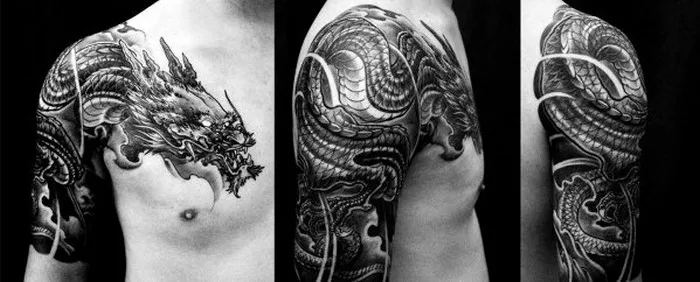Dragons have long captured the imagination of cultures worldwide, symbolizing power, wisdom, and often serving as guardians or symbols of good fortune. As such, it’s no surprise that many individuals are drawn to the idea of having a dragon tattoo adorning their bodies. However, before getting inked with this mythical creature, it’s essential to consider various factors, including cultural significance, personal meaning, and potential social or professional implications.
Understanding the Symbolism of Dragons
Across different cultures, dragons hold diverse meanings and symbolism. In Chinese culture, dragons are revered as symbols of strength, prosperity, and good luck. They are often depicted as benevolent creatures associated with water, rain, and fertility. Conversely, in Western mythology, dragons are sometimes portrayed as fearsome beasts to be slain, representing chaos and evil. However, they can also symbolize strength, courage, and protection.
Cultural Sensitivity and Appropriation
Before getting a dragon tattoo, it’s crucial to understand the cultural context and significance behind the design. For example, in Chinese culture, the dragon holds immense cultural importance and is deeply intertwined with traditional beliefs and symbolism. Therefore, it’s essential for individuals outside of this cultural background to approach the imagery respectfully and with awareness of its significance.
Appropriation occurs when elements of a marginalized culture are adopted by members of a dominant culture without proper understanding or respect for their origins. In the context of tattoos, cultural appropriation can be a concern if individuals choose designs with significant cultural or religious meaning without understanding or honoring their cultural significance.
Consulting with a Tattoo Artist
When considering a dragon tattoo, consulting with a skilled and reputable tattoo artist is paramount. A professional tattoo artist can help you refine your ideas, choose a design that resonates with you, and ensure the tattoo’s quality and longevity.
During the consultation process, be sure to communicate your thoughts, preferences, and any concerns you may have about the design. Additionally, don’t hesitate to ask your tattoo artist about their experience with creating dragon tattoos and their understanding of the cultural significance behind the imagery.
Personal Meaning and Connection
Beyond cultural symbolism, the decision to get a dragon tattoo often carries personal significance for individuals. For some, the dragon may represent overcoming adversity or embracing inner strength. For others, it may symbolize a connection to their heritage, a tribute to a beloved myth or story, or simply a love for fantasy and imagination.
Before getting inked, take time to reflect on what the dragon symbolizes to you personally. Consider how the imagery aligns with your values, experiences, and aspirations. By choosing a tattoo design that holds personal meaning, you can ensure that your body art resonates with you on a deeper level.
Considering Social and Professional Implications
While tattoos have become increasingly accepted in many social and professional settings, it’s essential to consider the potential implications of visible body art, including a dragon tattoo. In some conservative or traditional environments, tattoos may still be viewed negatively or be subject to dress code policies.
Before getting a tattoo, particularly one that is highly visible, consider how it may impact your personal and professional life. While attitudes towards tattoos are evolving, it’s important to be aware of any potential consequences and make an informed decision based on your individual circumstances.
Exploring Placement and Design Options
When it comes to getting a dragon tattoo, the possibilities for design and placement are virtually endless. From intricate full-back designs to subtle wrist or ankle tattoos, there are numerous options to suit every preference and style.
When choosing the placement of your tattoo, consider factors such as visibility, comfort, and how the design will complement your body’s contours. Additionally, work closely with your tattoo artist to create a design that reflects your vision while also showcasing their artistic expertise.
Caring for Your Dragon Tattoo
Once you’ve gotten your dragon tattoo, proper aftercare is essential to ensure its longevity and vibrancy. Follow your tattoo artist’s instructions for cleaning and moisturizing the tattooed area, and avoid exposing it to direct sunlight or soaking it in water until it has fully healed.
As your tattoo heals, be mindful of any signs of infection or irritation, such as excessive redness, swelling, or discharge. If you have any concerns about the healing process, don’t hesitate to contact your tattoo artist or seek medical advice.
Conclusion
In conclusion, the decision to get a dragon tattoo is a deeply personal one that should be approached with thoughtfulness, respect, and consideration for its cultural significance. By understanding the symbolism behind the imagery, consulting with a skilled tattoo artist, and reflecting on the personal meaning of the design, you can ensure that your dragon tattoo is a meaningful expression of your individuality and creativity. Additionally, it’s essential to consider the potential social and professional implications of visible body art and to care for your tattoo properly to ensure its longevity and vibrancy. Ultimately, a dragon tattoo can be a powerful symbol of strength, courage, and personal transformation for those who choose to adorn themselves with this mythical creature.

